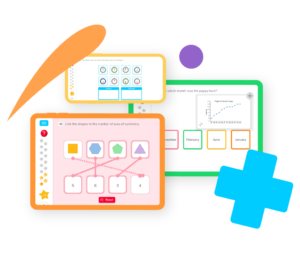Home → Maths → Maths skills
Learning maths doesn’t have to be a struggle. At DoodleLearning, we’ve taken the guesswork out of understanding maths curriculum concepts for Kindergarten to Year 8, making it easier for you to help your child build confidence and master key maths skills. Choose a topic below to explore our detailed guides, complete with practice questions to try at home!

There are a few things that set DoodleLearning apart from other maths skills sites. For one, all of our maths guides are written or reviewed by real primary maths teachers and tutors. Fueled by their classroom experience, our teaching experts write our maths guides in a way that’s easy for parents to follow along.
At the end of each maths skill page, you’ll find practice problems complete with an answer guide to help explain how we got to the answer. From mastering fractions to learning your times tables, browse our primary math concepts by topic.
Mathematics is a cornerstone of a child’s education, helping them develop critical thinking and problem-solving skills from an early age. In Australian primary schools, students work through maths concepts from Kindergarten to Year 6, gradually building skills that set them up for success in secondary school and beyond.
For parents, knowing what’s being taught at each stage makes it much easier to support learning at home. Here’s a closer look at some of the core topics:
A solid understanding of numbers is essential for everything else in maths.
Kindergarten–Year 2: Children focus on counting, reading, writing, and ordering numbers up to at least 100. They start to recognise odd and even numbers, explore patterns, and understand place value for tens and ones.
Years 3–6: This knowledge grows to include numbers in the thousands and beyond, decimals, and place value to at least one million. These skills form the backbone of more advanced mathematical thinking.
Addition and subtraction form the building blocks of arithmetic.
Kindergarten–Year 2: Students start with small numbers, working within 20, and begin solving simple word problems.
Years 3–6: They move on to larger numbers, regrouping (borrowing and carrying), and multi-step problems, developing strategies to solve increasingly challenging calculations.
Multiplication and division are introduced earlier than most people realise.
Kindergarten–Year 2: Children explore these operations through grouping, sharing, and repeated addition or subtraction.
Years 3–6: Students learn all their times tables up to 12, tackle formal written strategies like long multiplication and division, and use these skills to solve more complex problems. These operations become essential for success in higher-level maths.
Fractions start in Foundation, with simple concepts like halves and quarters. In Year 3, this extends to understanding equivalent fractions, adding and subtracting fractions with the same denominator, and finding fractions of numbers and quantities. Mastery of fractions is essential for success in secondary school maths topics.
Measurement involves understanding and using units of measure for length, mass, volume, and time. Foundation to Year 1 focuses on comparing and ordering lengths, mass, and volumes, while Years 3 to Years 6 cover more advanced concepts such as converting between different units of measure.
Geometry from Kindergarten to Year 2 introduces basic shapes, including 2D shapes like squares and circles and 3D shapes like cubes and spheres. By Year 3, students learn about properties of shapes, angles, symmetry, area, perimeter, and volume. This helps develop spatial awareness and problem-solving skills.
Kindergarten to Year 2 introduces children to simple data handling, such as creating and interpreting basic graphs and charts. From Year 3 to Year 6, students work with more complex data sets, learn to interpret and construct bar charts, pictograms, and line graphs, and understand concepts of averages. These skills are important for making sense of information and drawing conclusions.
Throughout primary school, children are encouraged to develop their reasoning skills. This involves explaining their thought processes, making connections between different areas of maths, and solving problems in a logical and systematic way. Reasoning is a key skill for all maths topics and beyond.
Mastering essential maths skills in primary school sets the stage for future academic success and practical life skills. By understanding and supporting the key areas of number and place value, arithmetic, fractions, measurement, geometry, statistics, and mathematical reasoning, parents and educators can help children build a strong mathematical foundation. Encouraging regular practice, making maths fun, and using real-world examples can make a significant difference in a child’s confidence and ability in maths. Embrace the journey of learning math topics, and you’ll be laying the groundwork for your child’s bright future.

Parents, sign up for a DoodleMaths subscription and see your child become a maths wizard!

Book a chat with our team
If you’d like to use Doodle’s browser version, please visit this page on a desktop.
To log in to Doodle on this device, you can do so through our apps. You can find out how to download them here: